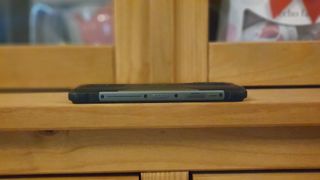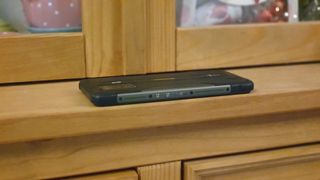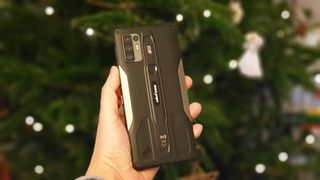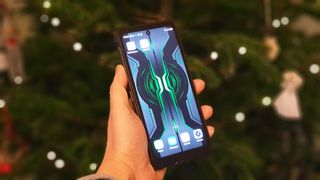TechRadar Verdict
So here we have it, the Armor 10, the first 5G rugged smartphone. Ulefone has set the benchmark for this category quite high and others will have to deliver very good products in order to match it. However, the wider issue remains the necessity of 5G when - for many applications - 4G is still plenty.
Pros
- +
Good price
- +
Best cameras on a rugged smartphone
- +
Good size battery
- +
Excellent build quality
- +
Wireless charging
Cons
- -
A bit bigger than expected
- -
Camera island is not ideal
- -
We’d prefer 256GB storage at this price
- -
5G still carries a significant premium
Why you can trust TechRadar
We got the first taste of a 5G-enabled rugged smartphone thanks to Ulefone, one of the three manufacturers - the other two being Blackview and Oukitel - to have unveiled (or promised to release) a 5G device before the end of 2020. The Armor 10 5G is an improvement on the award winning Ulefone Armor 9, which was the first Ulefone model to come with a FLIR thermal camera sensor.
Pricing and availability
At the time of writing, you can buy the Armor 10 from Banggood for $399.99, a 27% saving from its official selling price of $549.99.
- Want to buy tech from online Chinese retailers? Read this first.
Design
The Armor 10 faithfully follows the design philosophy of previous Ulefone smartphones. Reinforced rubber corners, a metal frame and a larger than average bezel. With a 6.7-inch display, it does qualify as a phablet, offering almost the same display size as a tablet like the Pebble Gear.

Its dimensions - 176.5 x 82.8 x 14.55mm - and weight (333g) means that it is a far cry, very far cry from the svelte profile of its non-rugged brethren. A big battery and additional protections - essential to get the MIL-STD-810G/IP69K certifications - unsurprisingly just make it heavier.

A flap covering a Type-C connector is located at the bottom of the Armor 10. A volume rocker and the power button can be found on the right while a dedicated customizable button and the SIM/memory card tray can be found on the left side.

The rear accommodates a speaker grill as well as four camera sensors next to the logotypes 5G and Ulefone. Sandwiched between the two is an inconspicuous octagonal fingerprint reader. We’re slightly concerned about the island design though as it protrudes so ever slightly that the fragile sensors might take the full force of a fall when falling flat on a hard surface.
All in all, it is large, feels heavy and built like a tank, easily capable of hurting someone when used as a projectile.
- Also check out our roundup of the best rugged tablets
Hardware
The Ulefone Armor 10 5G that was shipped to us came with the following hardware:
CPU: Mediatek Dimensity 800
GPU: Arm Mali-G57
RAM: 8GB
Storage: 128GB
Screen size: 6.6-inch
Resolution: 2400x1080
Weight: 333g
Dimensions: 176.5 x 82.8 x 14.55mm
Rear camera: 64MP, 8MP, 5MP, 2MP
Front camera: 16MP
OS: Android 10
Battery: 5.8Ah
Like all of its competitors and a lot of entry level 5G smartphones, the Armor 10 is powered by a Mediatek Dimensity 800 processor. The MT6873, as it is also known, combines a quartet of Cortex A76 cores with four A55 ones and an Arm Mali-G57 GPU set.
A combination of 8GB of LPDDR4x memory and 128GB of UFS2.1 storage means that this phone is as fast - when it comes to memory/storage - as a mainstream Windows laptop. The 6.67-inch display has a 2400 x 1080pixel display and Ulefone hasn’t confirmed if it is covered with a layer of scratch-resistant glass.
Other than the 5800mAh battery, Wi-Fi 5 and Bluetooth 5 connectivity and a 15W charger (5V,3A) there’s also an FM radio and five, yes five camera sensors, totaling a staggering 95-megapixel with the main one being a 64-megapixel model, the Samsung ISOCELL Bright GW1.

In use
The latest wireless update dates from December 3rd; the phone itself runs on a stock version of Android 10. Two benchmarks - Geekbench and 3D Mark Slingshot- didn’t run properly.
Ulefone claims that the phone offers 15W wireless charging capabilities but we didn’t have a wireless charger around to test it. We couldn’t find any physical marking on the phone to support Ulefone’s claims; it does support NFC though.
This is how the Ulefone Armor 10 5G performed in our suite of benchmark tests:
PCMark (Work 2.0): 8198
Passmark: 8795
Passmark CPU: 24018
Androbench (sequential): 912 (sequential read); 469 (sequential write)
Androbench (random): 173 (random read); 35 (random write)
3DMark Wild Life Vulkan: 1670
Since this is a Mediatek-powered device, it comes with a standard set of apps like Easy Launcher and Children Space which are supposed to be simplified user interfaces for the older generation and the younger one, paving the way for some interesting uses.
As expected, there’s also the ubiquitous toolbox set that contains a dozen free apps that will appeal to outdoor fans and DIY enthusiasts alike; the sound meter and the barometer are likely to be the more useful of the lot.
When it comes to sheer performance, the numbers show that the Ulefone Armor 10 5G behaves like a midrange smartphone with results that put it almost on par with the Samsung Galaxy S9. It trounces the latter when it comes to the imaging subsystem and the battery capacity.
The competition
Vendors like Doogee or AGM have been conspicuously absent from the conversation that saw Ulefone, Blackview and Oukitel issue almost daily press releases touting their wares.
Oukitel sells its WP10 for less than $380 at the time of writing although expect the prices to fluctuate heavily. It matches the Armor 10 almost spec-for-spec, down to the screen size and a 16-megapixel front facing camera. However the Oukitel has a bigger battery (8000mAh) and the ability to take on optional modules (to be confirmed) but is bigger, has no wireless charging and has a main camera sensor with a lower pixel count (48mp vs 64mp).
The BL6000 Pro from Blackview is the other 5G rugged smartphone vying for the top spot. It is far more expensive at $450 at the time of writing but comes with twice the onboard storage. It does however have a smaller battery (5.28Ah) and a camera sensor with a lower pixel count.
- These are the best business smartphones on the market
Final verdict
The Armor 10 5G didn’t put a foot wrong and to be honest, using the Armor 9 as the base chassis to build the former isn’t the worst of choices. The price is right, the set of components chosen is spot on and the final product is a joy to use. There are some design choices we’d probably argue but the biggest question is whether you need a 5G smartphone right now given that there are 4G ruggedised smartphones sporting similar hardware for much less. The well-received Armor 9E comes to mind.
- We've also highlighted the best rugged smartphones

Désiré has been musing and writing about technology during a career spanning four decades. He dabbled in website builders and web hosting when DHTML and frames were in vogue and started narrating about the impact of technology on society just before the start of the Y2K hysteria at the turn of the last millennium.

An incredible $100 billion bet to get rid of Nvidia dependence — tech experts reckon Microsoft will build a million-server strong data center that will primarily use critical inhouse components

The real total eclipse was better than the pics I shot with my iPhone 15 Pro Max and DSLR, and believe me I tried

Quordle today – hints and answers for Sunday, April 14 (game #811)
